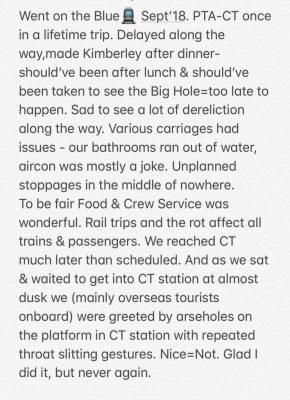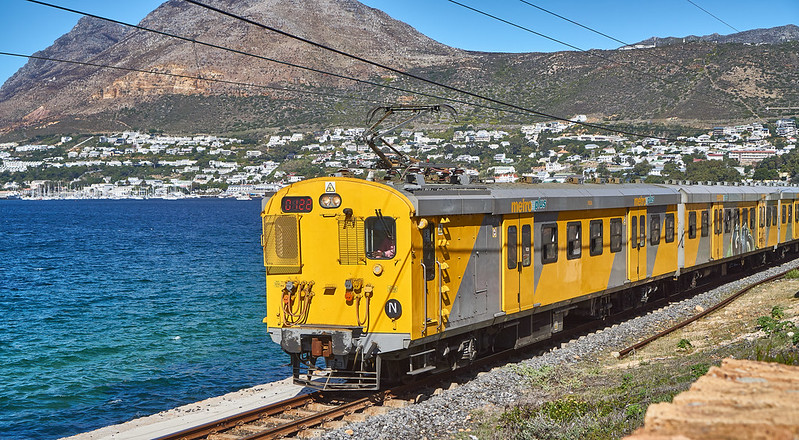
Is there any way to stop the Passenger Rail Agency of South Africa (Prasa) from railroading their passengers, before the wheels fall off?
An early 80s overlay colours my life to this day. Greyscale snapshots of poignant farewells and reunions at the station, landscapes sliding by, clickety-clack soundtracks, interminable waits at De Aar, koffie moffies rattling tea trolleys at strange hours. You for coffee? (I’m sleeping. You for coffee!)
In Europe, the trains arrive and leave like clockwork, offer clean cabins, and free newspapers for passengers. Several stations are architectural show pieces but in South Africa, our train services seem to be sliding off the rails.
J Brooks Spector’s illuminating piece in the Daily Maverick speaks of a foreign traveler ‘sobbing uncontrollably as she sat on the floor in the space between two carriages, clearly unaccustomed to the uncertainties and indignities of this kind of travel, lamenting the ruination of the timetable of her carefully structured holiday in South Africa.’
Danish friends – a lovely Copenhagen couple, who took Rovos Rail from Pretoria to Cape Town this month – a deluxe suite costs R36 500 per person – told me of their disappointment via email. To paraphrase: Food, drinks, and staff were top notch, but ‘ohhh, so not the start we expected’ when ‘signal problems’ forced them to take a bus for just under two hours to ‘get on the train behind the signals’.
Delay after delay followed, causing them to miss their Kimberley and Stellenbosch Winelands excursions. Hour after hour, they were ‘stuck in the middle of nowhere, without any nice spots, to wait for signals or to fix engines’.
When they finally arrived in Cape Town at midnight, seven hours past schedule, they had to sleep on the train. Nary an apology nor any compensation for the missed excursions. Cue angry emojis.
Brenda Vos-Fitchet, Communications Manager for Rovos Rail, said infrastructure upgrades being implemented by Siemens and Transnet (national railway authority), had impacted their operations and running times ‘in very challenging ways as we are only advised about line closures en route’.
She added that all trains utilising the railway network were also being brought to a standstill. ‟In addition, we were advised in November last year that the line between Germiston and Pretoria would be closed for 10 days in mid-December. This is the busiest line in Africa and … (the line) is, in fact, still not open. We have now brought our Cape Town departures back by four hours to compensate.
‟We run 65 trips a year to Cape Town and … the detour this closure has caused, costs on average four hours to navigate. This detour line is the only one available to the south, resulting in congestion.
‟A spate of copper theft mainly due to the upheaval within Prasa resulted in the retrenchment of 3 000 security personnel who subsequently went on the rampage and caused extensive damage to the railway network. (We hope) the new Board at Prasa can bring order to the present mess.
‟We offer eight journeys across southern Africa and the two-night Cape Town trip is currently our most challenging. We hope that all upgrades to the railway infrastructure will be completed by mid-2020 although that is only an estimated time that we have been given.”
 As for the Blue Train, a friend who recently took a trip up to Victoria Falls spoke of ‘cheap instant coffee’ at the station before departure while @melorigin on twitter wrote that their bathrooms ran out of water and described the air-con as ‘mostly a joke’.
As for the Blue Train, a friend who recently took a trip up to Victoria Falls spoke of ‘cheap instant coffee’ at the station before departure while @melorigin on twitter wrote that their bathrooms ran out of water and described the air-con as ‘mostly a joke’.
There was a time when the train traversing Cape Town’s coastline to Simon’s Town was one of the most scenic in the world. Now, the only way I’d board it would have to be at knife-point, which is not beyond the bounds of possibility.
Constantly plagued by vandalism, Cape Town’s metro rail no longer feels like a safe option and I certainly wouldn’t recommend it to tourists.
Just two days after the Prasa Group administrator visited Cape Town, train carriages were set on fire yet again.
Perhaps the only way to get our railway service back on track is to privatise it?







